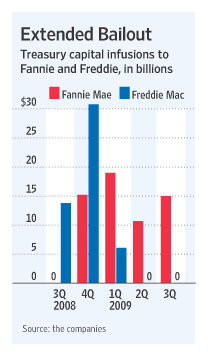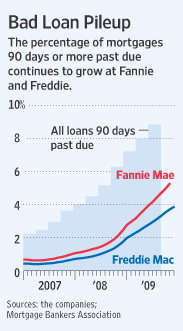WSJ: No Exit in Sight for US as Fannie (FNM), Freddie (FRE) Flail
This is a nice overview story in the Wall Street Journal on what FanFredron (Fannie + Freddie + Enron) have become: a governmental warehouse of losses to subsidize the US housing market. Supposedly 2010 was going to be the year the long term future of these entities was supposed to be determined - i.e.(a) fully socialize these 2 as permanent money losing apparatus as to keep housing prices elevated and "help" home ownership rates [that's working out great] (b) keep them as pseudo public-private monsters who have the impliciat backstop of the US government [worked like a charm] or (c) break them into smaller competitive companies and set them into the private marketplace to actually live and die on their own [the only one of the 3 that makes any sense in the long run unless you believe your grandchildren's money should go to subsidize others to buy homes on a permanent basis]. However, the federal government has decided - at least in budget terms - to "kick the can" (shocker) for another year with only a single line item in the budget. In place of any serious decisions is an unlimited loss potential to Americans [Jan 5, 2010: WSJ - The Treasury Department's Christmas Eve Masscare of the US Taxpayer] snuck in while most Americans were having holiday dinner ... and we'll call it a day! [Feb 1, 2010: 2 Graphs Showing Part of the Reason for the Christmas Eve Taxpayer Massacre]
Even better, much as some of our most dysfunctional corportations - such as Enron a decade ago, or more recently our financial oligarchs - "special off balance sheet entities" are held off the main balance sheet of the government, out of the prying eyes of the public. This eventually led to the implosion of Enron, and the implosion of such wonderful firms of Citigroup (they were called SIV's in Citi's case). I wonder what this "transparency" will eventually lead to for the federal government?
The story has some nice graphs attached.... including the costs thus far to feeding the monster that is FanFredron. After growing physically ill writing post after post tallying the losses; I'd much rather stick my head in the sand and sing great stories of 'recovery' (I am here to make the people smile)- so I enjoy when someone else keeps the totals. I've since ceased bothering, and let me tell you, the sand is awesome down here! [Nov 14, 2008: Freddie Mac First to the Trough] [Jan 25, 2009: Freddie Mac Saddles Up for Another $35B] [Mar 12, 2009: Fredie Mac is Back for More of Your Grandkids Money - $30.8B] [May 8, 2009: Fannie Mae with Next $19 Billion Bailout] I do have to say, it must really stink to be a renter in this country; almost like a 2nd class citizen. You are taken by the shoes, held upside down, shaken, and all the extra change is handed directly to your fellow citizen who 'owns' a home - even those who didn't put a dime down, or emptied all (bubble) equity via house ATM the past decade. Perhaps we need to brand these renters with scarlet R's on their foreheads, while we talk of them in hushed whispers?
Anyhow, it's neither here nor there - it is not like anyone could see this (cough) coming. [Sep 7, 2008: Bailout Nation Continues - Fannie/Freddie Now Owned by You] Just remember, unlike what most in pundit-land or government would have you believe we do still need to do cost-benefit analysis; not benefit-benefit analysis as is the current status quo. Anyone below the age of 10 will be receiving the 'costs' of said policies, which seem to have no end in sight. One can only wonder what new (cost free) 'innovations' are around the corner. [Nov 5, 2009: Fannie Mae's New Deed for Lease Program - Rent your Home from the Government]
Via WSJ:
- When Charles E. Haldeman Jr. became Freddie Mac's chief executive officer in August, the ailing housing-finance giant had already consumed $51 billion of government money to stay afloat. (since we have become numb to large numbers in this country, that amount would effectively let Greece kick the can for a good half decade) It's likely to need even more. (likely?) Freddie's federal overseers nevertheless have instructed Mr. Haldeman to focus on something that isn't likely to make the bleak balance sheet look any better: carrying out the Obama administration plan to allow defaulted borrowers to hang onto their homes.
- On a recent afternoon, employees at Freddie's headquarters here peppered Mr. Haldeman with concerns about the company's future. He responded that they were "fortunate" to have such a clear mission—the government's foreclosure-prevention drive. "We're doing what's best for the country," he told them. (viva el patriots!) "We're making decisions on [loan modifications] and other issues, without being guided solely by profitability, that no purely private bank ever could," Mr. Haldeman said in late January in a speech to the Detroit Economic Club.
- Fannie and Freddie remain troubled wards of the state, with no blueprints for the future and no clear exit strategy for the government.
 Nearly a year and a half after the outbreak of the global economic crisis, many of the problems that contributed to it haven't yet been tamed. The U.S. has no system in place to tackle a failure of its largest financial institutions. Derivatives contracts of the kind that crippled American International Group Inc. still trade in the shadows. And investors remain heavily reliant on the same credit-ratings firms that gave AAA ratings to lousy mortgage securities. (but other than that, things are going swimmingly)
Nearly a year and a half after the outbreak of the global economic crisis, many of the problems that contributed to it haven't yet been tamed. The U.S. has no system in place to tackle a failure of its largest financial institutions. Derivatives contracts of the kind that crippled American International Group Inc. still trade in the shadows. And investors remain heavily reliant on the same credit-ratings firms that gave AAA ratings to lousy mortgage securities. (but other than that, things are going swimmingly)- On Dec. 24, Treasury said there would be no limit to the taxpayer money it was willing to deploy over the next three years to keep the two companies afloat, doing away with the previous limit of $200 billion per company. (which I would like to remind readers was originally sold to us by Secretary of US Treasury Paulson as $100B per company - max! Which we publicly scoffed at in these very same web pages) So far, the government has handed the two companies a total of about $111 billion.
- The government is willing to tolerate such open-ended exposure for two reasons. First, it sees the companies as essential cogs in the fragile housing market. Fannie and Freddie buy mortgages originated by others, holding some as investments and repackaging others for sale to investors as securities. Together with the Federal Housing Administration, they fund nine in 10 American mortgages. Worries about potential insolvency would cripple their ability to fund home loans, which would hamstring the market. Second, the companies are a convenient tool for the administration to use in its campaign to clean up the housing mess. (i.e. it's the closest thing we have to Chinese style central command directives - shhhh, I meant free market capitalism reigns in America)
- Besides playing a key role in the loan-modification program, Fannie and Freddie have jump-started lending by state and local housing-finance agencies by helping to guarantee $24 billion in debt. They also are lending support to the apartment sector by becoming the main funders of loans to builders and buyers of apartment buildings.
- By using Fannie and Freddie for such initiatives, the White House doesn't have to go to Congress for funding. The Treasury and White House can simply issue instructions to Fannie and Freddie via their federal regulator, the Federal Housing Finance Agency, or FHFA. The government is "running Fannie and Freddie as an instrument of national economic policy, not as a business," says Daniel Mudd, who was forced out as Fannie Mae's chief executive in September 2008 when the government took control.
- Some housing experts contend that prolonged government intervention will make it more difficult and costly to eventually wean the companies off government support. "The more aggressively we continue kicking the can down the road, the larger the losses become and the harder it becomes" to address the companies' future, says Joshua Rosner, managing director at investment-research firm Graham Fisher & Co.
- As mortgage delinquencies rise, Fannie and Freddie are required to set aside more capital to cover anticipated losses. Each quarter, if their revenues are insufficient to meet those financial needs, the Treasury has to kick in more money. With delinquencies still rising, the outlook is grim. At Freddie, 3.87% of single-family mortgages were at least 90 days past due at the end of December, up from 1.72% a year earlier. Fannie is worse: 5.29% were 90 days past due in November, up from 2.13% a year earlier.
- Both Fannie and Freddie have struggled at times to adjust to the new marching orders. Fannie has warned in financial filings that the modification program had shifted "significant levels of internal resources and management attention" from other parts of the business, which could lead to a "material adverse effect" on the business.
- The Obama administration had said it would weigh in on how to revamp the companies when it released its proposed budget earlier this month. Instead, the budget contained only a single line about the companies' future, promising to "monitor the situation" and to "provide updates…as appropriate." (and that pretty much sums up American leadership on any issue - if it's difficult to deal with, kick it as far down the road as you can)
And what happens if you speak up in government and tell them the unvarnished truth? As Jack Nicholson tells us... we can't handle the truth.
- At Freddie, David Moffett, the chief executive who took over when the federal government assumed control, left last March after only six months, partly because it became clear that regulators would be calling the shots. He says he and others warned administration officials that the loan-modification goals were unrealistic, that borrowers whose homes weren't worth what they owed were unlikely to take part, and that many participants would be likely to re-default within months. "They really didn't want our views," Mr. Moffett says.
Other issues - and why the housing 'recovery' is being subsidized in yet another way....
- As foreclosures mount, Freddie finds itself with title to more and more homes. The company wants to price them to sell, but doesn't want to put downward pressure on overall housing prices.
That's one way to help keep inventory lower than it otherwise would be, and overstate prices. But oh, the costs...
- "Imagine having to keep the lawns mowed, the lights on, and the property secured for one house, let alone more than 40,000 homes all over the country," says Mr. Haldeman. "It's not an easy process."
Thankfully in Cramerica we only look at benefits. Costs are for the birds.
The preceding article is from one of our external contributors. It does not represent the opinion of Benzinga and has not been edited.
© 2025 Benzinga.com. Benzinga does not provide investment advice. All rights reserved.



